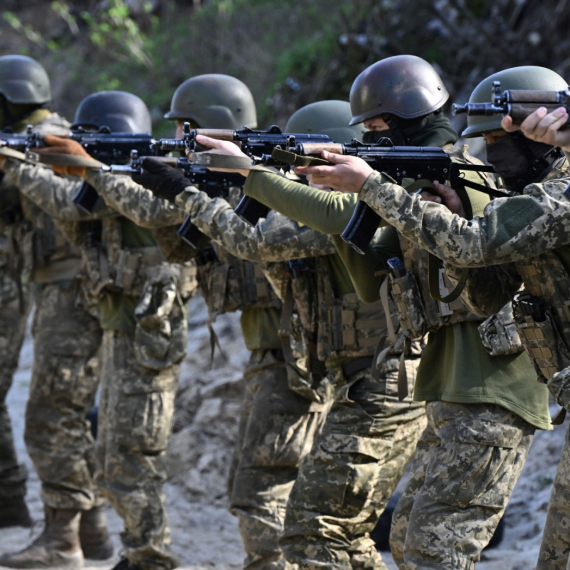Afghans caution against scale back of U.S. effort
Top Afghan officials say now is not the time for the United States to lower its expectations or dramatically change its mission for Afghanistan.
Sunday, 01.03.2009.
11:09

Top Afghan officials say now is not the time for the United States to lower its expectations or dramatically change its mission for Afghanistan. They made those comments this week in Washington, where they and senior Pakistani officials met with U.S. officials to discuss regional security and strategy. Afghans caution against scale back of U.S. effort The discussions come as the Obama administration reviews strategy in both Afghanistan and Pakistan. Before a NATO summit in April, the US says it will ask its coalition partners for greater contributions to the war in Afghanistan. With Taliban fighters making inroads in Afghanistan, President Barack Obama has pledged an additional 17,000 U.S. troops for the war effort there. But even with that promise, the scope of the U.S. mission remains unclear. Defense Secretary Robert Gates has suggested the U.S. should scale back its effort in Afghanistan, focusing on counter-terrorism over broader goals. This week Afghanistan's foreign and defense ministers met in Washington with senior U.S. officials. In separate appearances at Washington research institutes, they said the U.S. must not reduce its effort in Afghanistan. Defense Minister Abdul Rahim Wardak said, " Changing course, adopting a new strategy of containment, or dropping the idea of a strong central government will be falling into the trap which the enemy has laid, helping them to realize their evil objectives." Afghan foreign minister Rangin Dadfar Spanta said fighting insurgents in neighboring Pakistan is more important than ever. "...The main threat center for stability in the world is not Iraq, is not Afghanistan. It is much more Pakistan," he said. "If Pakistan becomes a failed state, this is a serious threat for you, for us, and for the entire region." Afghanistan and Pakistan are both facing mounting insecurity. In the past, each has blamed the other for the Taliban insurgency in Afghanistan. The Afghan officials attended trilateral talks in Washington with senior Pakistani and U.S. officials, including Secretary of State Hillary Clinton. As the Obama administration continues its review of the war effort in Afghanistan and policies toward that nation and neighboring Pakistan, Senator John McCain spoke out this week. He argued for a broad strategy to boost Afghanistan's development and improve its government. McCain stated, "The problem in Afghanistan today is not innate xenophobia or hostility to the West. It is our own failed policies that are the problem. We have tried to win this war without enough troops, without sufficient economic aid, without effective coordination, and without a clear strategy." McCain called on the U.S. and other nations to help double the size of the Afghan army. The U.S. says it will ask other NATO countries to step up their contribution to the war effort in Afghanistan prior to an alliance summit in France and Germany in April.
Afghans caution against scale back of U.S. effort
The discussions come as the Obama administration reviews strategy in both Afghanistan and Pakistan.Before a NATO summit in April, the US says it will ask its coalition partners for greater contributions to the war in Afghanistan.
With Taliban fighters making inroads in Afghanistan, President Barack Obama has pledged an additional 17,000 U.S. troops for the war effort there.
But even with that promise, the scope of the U.S. mission remains unclear.
Defense Secretary Robert Gates has suggested the U.S. should scale back its effort in Afghanistan, focusing on counter-terrorism over broader goals.
This week Afghanistan's foreign and defense ministers met in Washington with senior U.S. officials.
In separate appearances at Washington research institutes, they said the U.S. must not reduce its effort in Afghanistan.
Defense Minister Abdul Rahim Wardak said, " Changing course, adopting a new strategy of containment, or dropping the idea of a strong central government will be falling into the trap which the enemy has laid, helping them to realize their evil objectives."
Afghan foreign minister Rangin Dadfar Spanta said fighting insurgents in neighboring Pakistan is more important than ever. "...The main threat center for stability in the world is not Iraq, is not Afghanistan. It is much more Pakistan," he said. "If Pakistan becomes a failed state, this is a serious threat for you, for us, and for the entire region."
Afghanistan and Pakistan are both facing mounting insecurity. In the past, each has blamed the other for the Taliban insurgency in Afghanistan.
The Afghan officials attended trilateral talks in Washington with senior Pakistani and U.S. officials, including Secretary of State Hillary Clinton.
As the Obama administration continues its review of the war effort in Afghanistan and policies toward that nation and neighboring Pakistan, Senator John McCain spoke out this week.
He argued for a broad strategy to boost Afghanistan's development and improve its government.
McCain stated, "The problem in Afghanistan today is not innate xenophobia or hostility to the West. It is our own failed policies that are the problem. We have tried to win this war without enough troops, without sufficient economic aid, without effective coordination, and without a clear strategy."
McCain called on the U.S. and other nations to help double the size of the Afghan army.
The U.S. says it will ask other NATO countries to step up their contribution to the war effort in Afghanistan prior to an alliance summit in France and Germany in April.
















Komentari 0